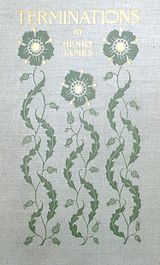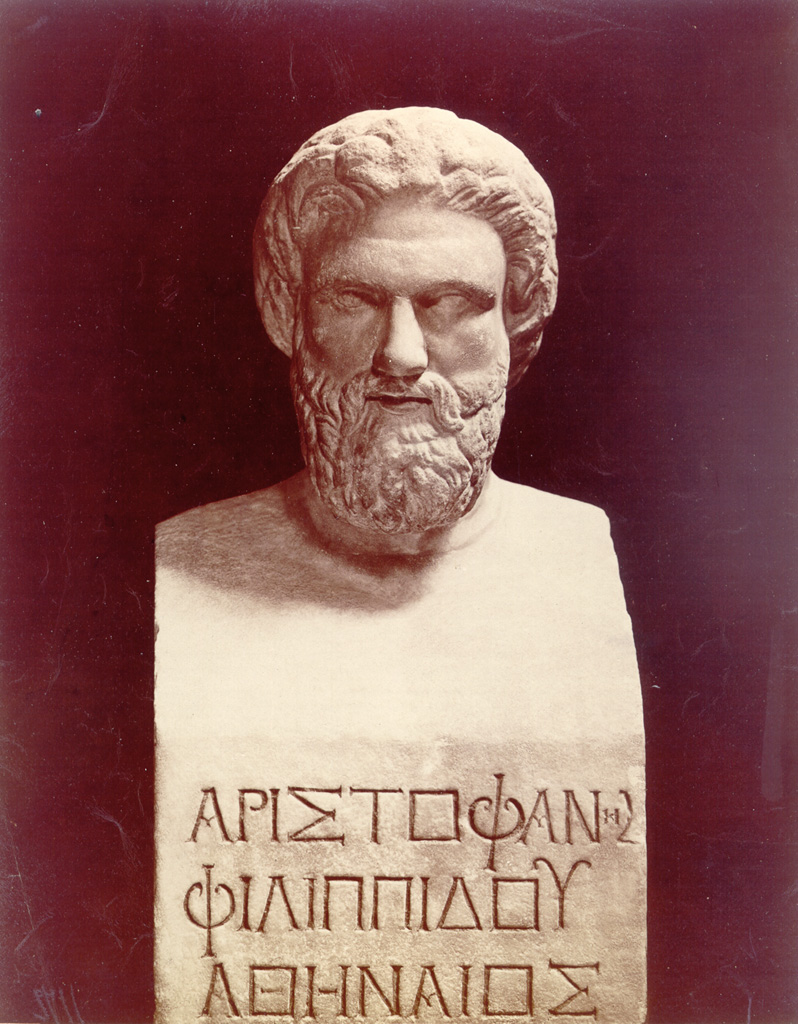Plot summary
Frank Saltram is a man who apparently has a towering intellect, but one that manifests itself only in sparkling table-talk. He has a real and powerful gift to delight with his conversation, particularly when intoxicated, but other than conversation he produces nothing. Saltram also recognises no obligations or duties, is ungrateful and utterly unreliable, and is apparently prone to immoral acts. He lives off others, particularly the Mulvilles, who, convinced of Saltram's genius and genuinely enjoying his talk, host him for months at a time. In the opinion of the unnamed narrator, Saltram is not a deliberate conman; he simply suffers from "a want of dignity".
The story revolves around Saltram and a group of people who are fascinated by him. Ruth Anvoy, a young American woman with a wealthy father, comes to Britain to visit her widowed aunt Lady Coxon. There she meets George Gravener, a man with a real intellect and a future in politics, and the two become engaged. She also meets Saltram, and is fascinated and impressed by his talk and intellect, though aware that he has shortcomings of character.
Having made a promise to her now-deceased husband, Lady Coxon has for years been seeking to bestow a sum of 13,000 pounds upon a talented intellectual whose potential has been hampered by lack of money. Having failed to find such a person, Lady Coxon tells Anvoy that upon her death the money will be left to her, and she must carry on the quest.
Anvoy's father suffers heavy financial losses and loses most of what he has. He dies, and shortly afterwards Lady Coxon dies. Anvoy, having lost nearly all her wealth, has only the 13,000 pounds from Lady Coxon, with a moral but not legal obligation to give it away. Gravener urges her to keep the money, as it could be used to buy them a house once they are married. She refuses, and their relationship becomes strained. Later, she entertains the idea of giving the money to Saltram, who Gravener despises as a fraud and "not a gentleman." Eventually their engagement is broken off.
Finally, the unnamed narrator is given a sealed letter and asked to give it to Anvoy. The letter is understood to contain a denunciation of Saltram's most immoral acts. The narrator must decide whether to blight Saltram's prospects by delivering the letter. He is willing to do so if it will save his friend Gravener's engagement with Anvoy, but Gravener is unable to assure him of this.
Eventually he does offer the letter to Anvoy, but Anvoy declines to read it. She awards the Coxon Fund to Saltram, who lives off it exactly as he lived off his friends, producing nothing of intellectual value. Thus the only result of the award is the Mulvilles and others lose the pleasure of Saltram's conversation.

The Way of All Flesh is a semi-autobiographical novel by Samuel Butler that attacks Victorian-era hypocrisy. Written between 1873 and 1884, it traces four generations of the Pontifex family. Butler dared not publish it during his lifetime, but when it was published it was accepted as part of the general reaction against Victorianism.

Anne Isabella Noel Byron, 11th Baroness Wentworth and Baroness Byron, nicknamed Annabella and commonly known as Lady Byron, was the wife of poet George Gordon Byron, more commonly known as Lord Byron.

The Portrait of a Lady is a novel by Henry James, first published as a serial in The Atlantic Monthly and Macmillan's Magazine in 1880–81 and then as a book in 1881. It is one of James's most popular long novels and is regarded by critics as one of his finest.
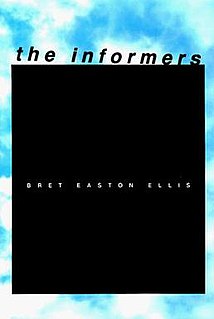
The Informers is a collection of short stories, seemingly linked by the same continuity, authored by American author Bret Easton Ellis. It was first published as a whole in 1994. Chapters 6 and 7, "Water from the Sun" and "Discovering Japan", were published separately in the UK by Picador in 2007. It displays attributes similar to Ellis' novels Less Than Zero, The Rules of Attraction, and, to a lesser extent, American Psycho. Like many of Ellis' novels, the stories here are set predominantly in California.
"Araby" is a short story by James Joyce published in his 1914 collection Dubliners.
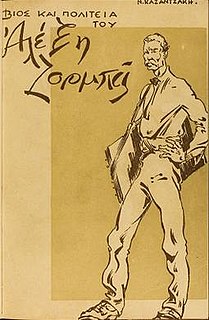
Zorba the Greek is a novel written by the Cretan author Nikos Kazantzakis, first published in 1946. It is the tale of a young Greek intellectual who ventures to escape his bookish life with the aid of the boisterous and mysterious Alexis Zorba. The novel was adapted into a successful 1964 film of the same name by Michael Cacoyannis as well as a 1968 musical, Zorba.

Aurora Leigh (1856) is an epic novel/poem by Elizabeth Barrett Browning. The poem is written in blank verse and encompasses nine books. It is a first person narration, from the point of view of Aurora; its other heroine, Marian Erle, is an abused self-taught child of itinerant parents. The poem is set in Florence, Malvern, London and Paris. The author uses her knowledge of Hebrew and Greek, while also playing off modern novels, such as Corinne ou l'Italie by Anne Louise Germaine de Staël and the novels by George Sand. As far as Book 5, Aurora narrates her past, from her childhood to the age of about 27; in Books 6–9, the narrative has caught up with her, and she reports events in diary form. Elizabeth Barrett Browning styled the poem "a novel in verse", and referred to it as "the most mature of my works, and the one into which my highest convictions upon Life and Art have entered." Scholar Deirdre David asserts that Barrett Browning's work in Aurora Leigh has made her into "a major figure in any consideration of the nineteenth-century woman writer and of Victorian poetry in general." John Ruskin called it the greatest long poem of the nineteenth century.

The Pallbearer is a 1996 American romantic comedy film co-written and directed by Matt Reeves and starring David Schwimmer, Gwyneth Paltrow, Toni Collette, Michael Vartan, Michael Rapaport, and Barbara Hershey. It was screened in the Un Certain Regard section at the 1996 Cannes Film Festival.

Green Shadows, White Whale is a 1992 novel by Ray Bradbury. It gives a fictionalized account of his journey to Ireland in 1953-1954 to write a screen adaptation of the novel Moby-Dick with director John Huston. Bradbury has said he wrote it after reading actress Katharine Hepburn's account of filming The African Queen with Huston in Africa. The title itself is a play on Peter Viertel's novel White Hunter, Black Heart, which is also about Huston.

The Actress is a 1953 American comedy-drama film based on Ruth Gordon's autobiographical play Years Ago. Gordon herself wrote the screenplay. The film was directed by George Cukor and stars Jean Simmons, Spencer Tracy, Teresa Wright, and Anthony Perkins in his film debut.

What Ever Happened to Aunt Alice? is a 1969 American thriller film directed by Lee H. Katzin with Bernard Girard (uncredited), and starring Geraldine Page, Ruth Gordon, Rosemary Forsyth, Robert Fuller and Mildred Dunnock. The screenplay by Theodore Apstein, based on the novel The Forbidden Garden by Ursula Curtiss, focuses on an aging Arizona widow who hires elderly female housekeepers and cons them out of their money before murdering them.
Wilhelm Meister's Journeyman Years, or the Renunciants, is the fourth novel by German writer Johann Wolfgang von Goethe, and the sequel to Wilhelm Meister's Apprenticeship (1795–96). Though initially conceived during the 1790s, the first edition did not appear until 1821, and the second edition—differing substantially from the first—in 1829.
A Dill Pickle is a 1917 short story by Katherine Mansfield. It was first published in the New Age on 4 October 1917. A revised version later appeared in Bliss and Other Stories. The characters and their relationship were possibly inspired by Mansfield's older sister Vera Margaret Beauchamp and her husband James Mackintosh Bell.
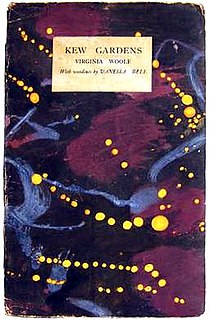
"Kew Gardens" is a short story by the English author Virginia Woolf.
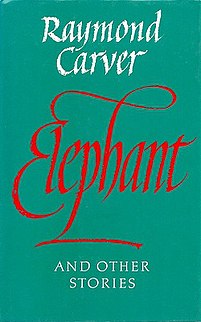
Elephant is a collection of short stories by American writer Raymond Carver published in Great Britain, 1988. The stories in the collection were first published in the United States in Where I'm Calling From: New & Selected Stories (1988).
"Thrown Away" is a short story by British author Rudyard Kipling. It was published in the first Indian edition of Plain Tales from the Hills (1888), and in subsequent editions of that collection.

Amok is a novella by the Austrian author Stefan Zweig. First printed in the newspaper Neue Freie Presse in 1922, Amok appeared shortly afterwards in the collection of novellas Amok: Novellas of a Passion. As Zweig was fascinated and influenced by Sigmund Freud’s work, Amok includes clear psychoanalytical elements. It deals with an extreme obsession, which leads the protagonist to sacrifice his professional and private life and, eventually, to commit suicide.
Fucking A is a play written by American playwright Suzan-Lori Parks. It was produced by DiverseWorks for Infernal Bridegroom Productions, and premiered at the DiverseWorks Artspace in Houston, Texas on February 24, 2000.
Madea's Neighbors From Hell is a 2014 parodic comedy-drama play created, written, produced, and directed by Tyler Perry. It stars Tyler Perry as Mabel "Madea" Simmons, and Madea's neighborhood takes a turn for the worse when a foster mother moves in with her unruly kids.

Henrietta is an 18th-century novel by Scottish author Charlotte Lennox. The first edition was published in 1758, and the second edition, revised by Lennox was published in 1761.

